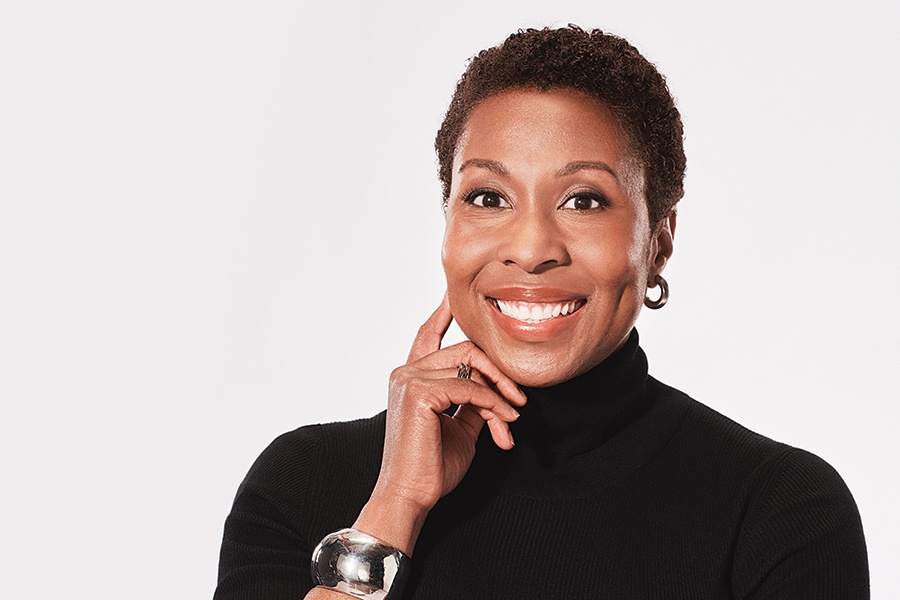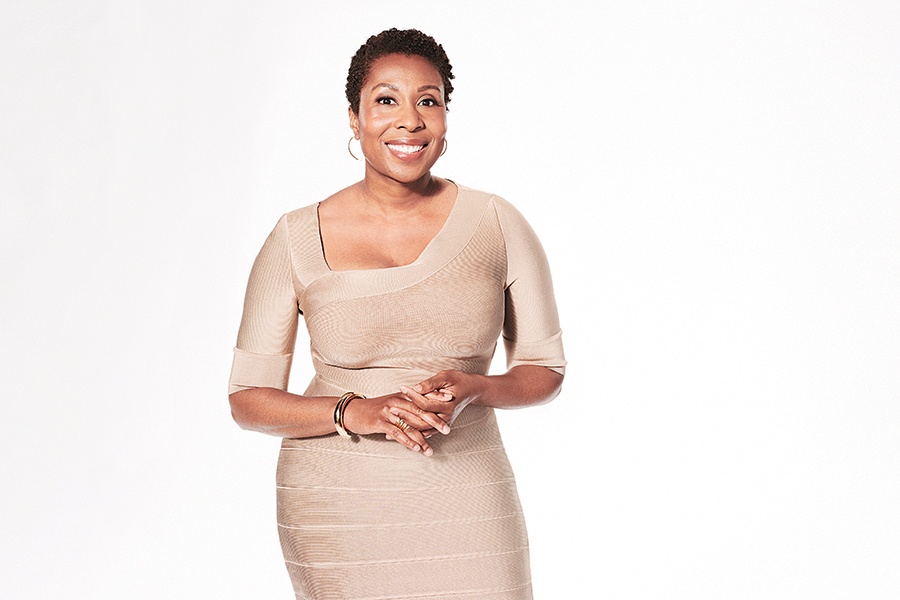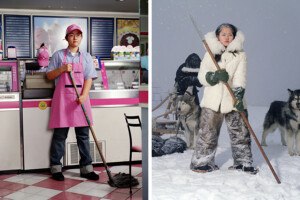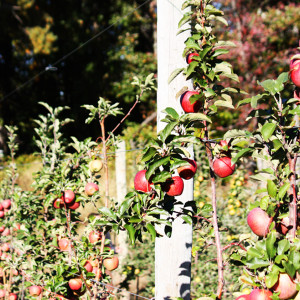The Interview: CNN Anchor and Correspondent Audie Cornish
How do you make it from the South Shore all the way to CNN? The network's newest anchor tells all.

Photo by Mary Ellen Matthews/Cable News Network a WarnerMedia Company
In January, longtime All Things Considered host Audie Cornish shocked fans when she announced she was leaving NPR to join CNN+. Just four months later, the new streaming service became a surprising casualty of the merger between WarnerMedia (the cable giant’s parent company) and Discovery. But that didn’t stop the Randolph native and UMass graduate—best known for her penetrating interviews with newsmakers and cultural figures ranging from Bruce Springsteen to Barack Obama—who has landed on her feet as an anchor and correspondent on the network, as well as the host of a podcast on CNN Audio. Ahead of a busy midterm election season, she spoke with us about the current state of news, what makes a good interview, and sounding dorky on-air.
Let’s start with an easy question: Is Ari Shapiro the handsomest man in the news business?
[Laughs.] He’s got lots of competition, but he’s probably the handsomest man in radio. I think I can say that fairly confidently.
What was the most daunting thing about the transition from radio to TV?
I would probably say my own mindset. There were so many skills that I needed to grasp quickly. At first, I was nervous I wouldn’t be able to do it. The more I’ve done it, the more fun I’ve had. It’s turned out to be really one of the most exciting things I’ve done in my career.
Are you excited to now be on the CNN flagship and hosting a podcast, with CNN+ not taking off like everyone thought it would?
Change. Risk. These are not bad things. I’m platform agnostic. Being on TV is one way to tell a story. Being on a podcast is another. Both are fun and inform the audience in distinct and important ways. And it’s an exciting challenge to get to do both.
What are your main sources for news?
I can confidently say CNN. It’s a little bit of an unfair question to ask a journalist, because we’re news omnivores. We’re in rooms with cable news going all day, all of the networks. And at my house, we have subscriptions to the New York Times and the Washington Post. We have a ton of magazines, more than we can read. So, it’s more like, what don’t I watch or read?
Are you a Twitter person?
Yeah, probably a little more than Instagram. But I’m an Instagram lurker. For sure, sometimes, when I just want to say, “Hey, I need to see what’s going on,” I will often check Twitter.
What are your thoughts on the nonstop news cycle? When I was younger, you received the news once or twice day.
True, and I think what’s also striking is that we’re taking in news along with the news of our family and friends, and the news in our communities, and it’s all coming to us in one continuous feed or another. That’s what social media does. I think that’s something that makes this period distinct.
Who’s the journalist you currently admire most?
Good question. Maria Ressa. She’s the CEO of Rappler, which is a news organization in the Philippines. She won a Nobel Peace Prize, so it’s not like I’m the first to say, “You seem like you’re doing good work.” But she’s somebody who’s really fighting the good fights as a journalist. She’s been arrested by the Duterte government. She’s an example of what it looks like when we do this well, and when we do the job the way we should, and what it looks like is still very hard and sometimes dangerous.

Photo by Mary Ellen Matthews/Cable News Network a WarnerMedia Company
What’s the historical event you most would have liked to cover, or witness?
Some of those events are, by definition, during moments of turmoil and difficulty, so it’s complicated. There are definitely some eras of civil rights reporting, the kind of Ida B. Wells, muckraker years…or who wouldn’t want to be at the March on Washington? But as a Black woman reporter, I’m also cognizant that anytime someone asks one of those time-travel questions, there’s an asterisk. Yes, I’d like to go back. Also, my life would be in danger. Those periods of history are striking. At the same time, we’re kind of in one now.
Does being a Black woman in journalism inform everything you do?
I think it informs everything I do in the way that it would for a white man. We’re all informed by our backgrounds, how we grew up, where we come from, the schools we went to, our parents, all the things our parents bestow on us in the way of privilege that gets us to where we are, especially in journalism…we’re all informed by those things.
What’s one headline you were absolutely thrilled to announce?
I have to be honest with you, it’s been a dark couple of years. There are moments, obviously, where you get to do an interview that’s positive and interesting. And I think that’s why sometimes entertainment interviews can matter. Not that you want to be part of the marketing juggernaut that is Hollywood, or the record companies, but sometimes, sitting down with an artist—whether it’s Alicia Keys or Kehinde Wiley—to say, “How do you make sense of the world? How do you put something out there that enlightens and brings joy?” that can be a wonderful conversation to have, and a necessary conversation to have. But I can’t picture something where I got on the air and was like, “Today is a great day.” That’s kind of not the job.
But if you could wish for one thing to announce?
The war is over?
Have any of your guests made you starstruck?
I try not to do that too often. Number one, meeting your heroes is disappointing. And so I avoid it mostly. Also, I don’t think it always makes for good interviews. Sometimes, when you truly love someone or something, you’re a little bit blind to what’s not so great about it, or you lose your ability to challenge it. And so I don’t frequently choose to go in a direction like that. There are some people who I’ve just enjoyed because they’re a delight, or they’re particularly thoughtful. You know, I always love to interview someone like Ta-Nehisi Coates or Dave Eggers. Authors are wonderful to interview. Roxane Gay. Then there are people who are unexpectedly delightful, like Flea, from the Red Hot Chili Peppers. He was remarkable and wrote a very thoughtful, well-written memoir a few years back. And I’d say the actress Regina King is a good example of someone who’s just so wonderfully down-to-earth that you feel like you’re talking to a friend.
Are the big cable companies going to eventually become a thing of the past?
That’s really something for a media analyst to answer. What I care about is getting the news to people who want it, in the easiest and most efficient way possible. I want everyone to have access to vetted information and facts. It’s important to our democracy. Cable remains an important part of that ecosystem.
What do you think is the future of streaming, in particular news-program streaming?
It’s funny to hear people talk about the future of streaming because streaming has been here for a long time, but how the news business evolves is a story that is still being written.
What was your worst on-air faux pas?
Oh, God, there are so many. I mean, I lay in bed at night and look up at the ceiling, thinking of some ridiculous thing I said in an interview that just sounded dorky or didn’t make sense. But the good news is that you get to wake up and do it all over again.
Biggest surprise a guest ever sprung on you?
Spike Jonze gave me a hug. I wasn’t expecting that. But in terms of material things, I don’t accept gifts. Even if someone wants to send us something, I do what I learned from the Associated Press. Basically, you give it to the office. Anyone can pass by, someone from the mailroom or whatever, and have it.
What are the greatest lengths you’ve ever gone to for a story or an interview?
I don’t consider them great lengths. That’s kind of the journey. I remember doing a story about a cold case in Alabama. The man who was shot, his death triggered the protests that culminated in the Selma to Montgomery march. Most people don’t pay attention to that part; they just remember everyone crossing the bridge, right? So, the state trooper who fired the gun turned himself in, years later. He was 73 at the time. It was one of those stories where, to really get it, I had to go there, to this tiny town in Alabama. This was pre-social media. So I’m walking around, and this older man pulled up in a giant ’80s-style sedan. He asked, “Who’re you looking for?” I told him the daughter of this man who had been killed, and he goes, “Oh, I know where she is.” And God help me, I got into his car, and he brought me to her.
It must have been strange being a Boston kid covering the South.
It was. I was about 25 or 26, and when you grow up in Massachusetts, you think Providence is far. It’s like, “I have to drive to UMass? That’ll take years.” And then, all of a sudden, I’m in the South, where I was routinely driving from Nashville, to Memphis, to Birmingham.
What’s the biggest difference between the corporate culture at NPR and CNN?
It’s a bit of an apples and oranges comparison, because CNN is vast, size-wise. It’s just a much bigger company, something like 4,000 employees. And you can see that on display, right now with Ukraine. Just the sheer volume of coverage and resources they can put there. But in that way, it’s a lot like NPR, which punches way above its weight. Right now, some of my former colleagues—Ari Shapiro, Tim Mak, Rachel Martin—they’ve all been in the region to cover some part of the war or refugee crisis. So that part feels very familiar to me.
What do your kids think about what you do?
They don’t really know what I do. They’re both under five. They have a vague sense. I think they’ve heard my voice on the radio.
Your husband is a journalist, too. How do you have two journalists under one roof, with two kids?
Well, the laundry isn’t done. [Laughs.] But he’s a book editor now. I’m looking at the most recent one, on the dining room table. It’s called The Way Forward by Robert O’Neill and Dakota Meyer, who are two well-known, elite soldiers. He helps people write books. But to answer the question, I think we both had long careers prior to having our kids, and now, we’re more oriented toward making careers where we can raise them.
Biggest challenge in finding that work/life balance?
I’ve come to the realization that there’s no such thing. It’s never going to be perfectly balanced. But I do find that what’s important is to create boundaries. That can be really hard to do in a work culture that, for many years, has told us there should never be boundaries and that if you feel you need that, you somehow aren’t doing your job. That’s the recipe, frankly, for an abusive relationship. There was that Silicon Valley approach for a while that said if there are enough pizza nights or whatever, you’ll just love it here so much, and you won’t notice that the boundaries in your life have been erased in ways that are not actually beneficial to you at all. I think people are learning to set boundaries again, and companies are learning that they’ll fight for them, and that’s good for all of us.
So you can have it all, just not at the same time?
It took me a long time to learn that. And my career will look different now because of that. And I’m okay with it.


